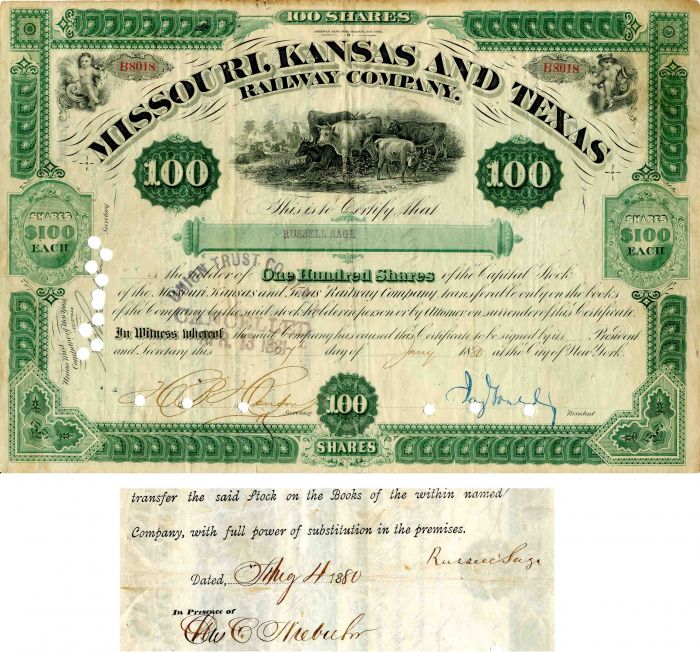Missouri, Kansas and Texas Railway Co. Signed by Russell Sage and Jay Gould - 1880 dated Autograph Railroad Stock CertificateStock Certificate - "The Katy"
Inv# AG2322 Stock
Missouri
Texas
Stock issued to and signed on back by Russell Sage. Also signed by Jay Gould as president.

Russell Sage (1816-1906) Banker; Financier; U.S. Congressman. As the originator of "put and call options", Sage greatly changed the way speculators played the stock market. Among America's most powerful and wealthy bankers, he financed Jay Gould and made a vast fortune on the latter's stock manipulations. "Sage was one of the shrewdest and most conservative of all great financiers." At one time he is said to have had $27,000,000 out on call loans. At the time of his death he left a fortune worth an estimated $70,000,000.
Sage was born in the Mohawk Valley and came to Troy to work in his brother’s dry goods store. He became an important figure in Troy, elected to several offices. But he soon expanded beyond Troy. His first wife, Maria, was an Emma Willard graduate but died early and childless. He sought another wife who might be another Emma graduate and whose family would give him proper credentials. His second wife was Margaret Olivia Slocum, who fit all his requirements. They moved to New York City, to a mansion on 5th Avenue, and Russell became allied with Jay Gould. Together they were part of a group which the history books call "robber barons". The Sage-Gould duo bought railroads all over America, including the famous elevated railroad in NYC. They became big investors in the stock market, where it is said Sage invented "puts" and "calls". Sage died in the early 1900’s as perhaps the "19th wealthiest American ever", according to a Fortune publication of the "100 richest" people ever in the American millennium craze pre-2000.
Sage died childless, leaving his widow, Margaret Olivia Slocum Sage, the wealthiest woman in America. She chose to be buried in Syracuse with her parents, but was noted as a major philanthropist nation-wide. It has been said that she endowed causes and institutions which her husband would have opposed, such as higher education in general and education for females. A major national cartoon from the early 1900’s shows "Uncle Sam" behind a bank teller’s window, collecting the first national income tax payments. First in line is Russell Sage, a well-known miser, having a hard time getting his payment out of his pocket. Behind him is Hetty Green, another famous miser, known as "the Witch of Wall Street". Last in line is Jay Gould, Russell Sage’s colleague. All are very unhappy to be paying the U. S. any money. Sage’s wife, Margaret, buried him in a Greco-Roman mausoleum by himself, without his name on it, and with a Medusa’s head, snakes and all, carved on a small marble bench next to the mausoleum.

Jason “Jay” Gould (1836-1892) was born in Roxbury, N. Y., the son of John Burr Gould and Mary Moore Gould. He studied at the Hobart Academy, but left at age 16 to work for his father in the hardware business. He continued to devote himself to private study, emphasizing surveying and mathematics. Gould later went to work in the lumber and tanning business in western N. Y. and then became involved with banking in Stroudsburg, PA. In 1856 he published the History of Delaware County. He married Helen Day Miller in 1863 and had 6 children.
It was during the same period that Gould and James Fisk became involved with Tammany Hall. They made Boss Tweed a director of the Erie RR., and Tweed, in return, arranged favorable legislation for them. Tweed and Gould became the subjects of political cartoons by Thomas Nast in 1869. In 1871 when Tweed was held on $8 million bail, Gould was the chief bondsman.
In August 1869, Gould and Fisk began to buy gold in an attempt to corner the market. During this time, Gould used contacts with President Ulysses S. Grant's brother-in-law to try to influence the president and his Secretary General. These speculations in gold culminated in the panic of Black Friday, on September 24, 1869, when the premium over face value on a gold Double Eagle fell from 62% to 35%. Gould made a nominal profit from this operation, but lost it in the subsequent lawsuits. The affair also cost him his reputation.
After being forced out of the Erie Railroad, in 1879 he started to build up a system of railroads in the Midwest by gaining control of four western railroads, including the Union Pacific and Missouri Pacific. In 1880, he was in control of 10,000 miles of railway and by 1882 he had controlling interest in 15% of the country's tracks. Gould withdrew from management of the UP in 1883 amidst political controversy over its debts to the federal government, realizing a large profit for himself.
Gould also obtained a controlling interest in the Western Union telegraph company, and in the elevated railways in New York City. He was connected with many of the largest railway financial operations in the U. S. from 1868-1888. During the Great Southwest Railroad Strike of 1886 he hired strikebreakers; according to labor unionists, he said at the time, "I can hire one half of the working class to kill the other half."
In his lifetime and for a century after, Gould had a firm reputation as the most unscrupulous of the 19th century American businessmen known as robber barons.
A stock certificate is issued by businesses, usually companies. A stock is part of the permanent finance of a business. Normally, they are never repaid, and the investor can recover his/her money only by selling to another investor. Most stocks, or also called shares, earn dividends, at the business's discretion, depending on how well it has traded. A stockholder or shareholder is a part-owner of the business that issued the stock certificates.









Ebay ID: labarre_galleries